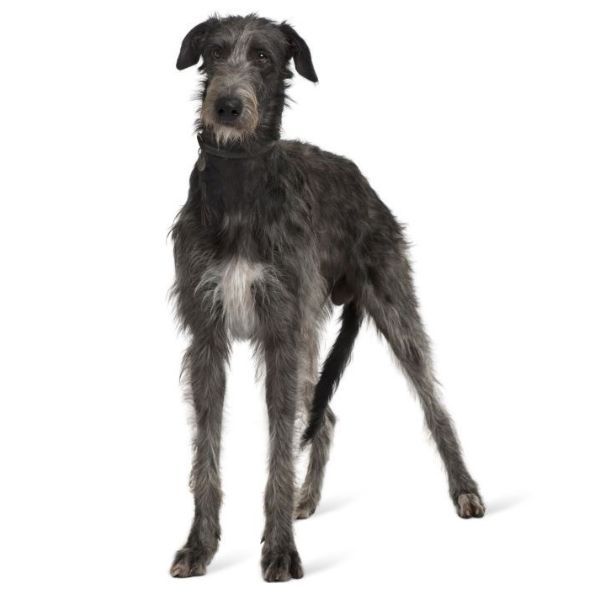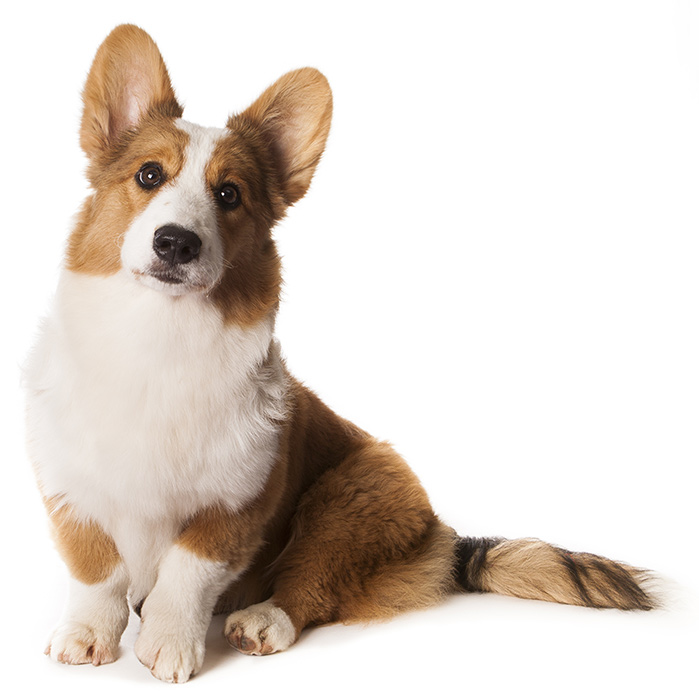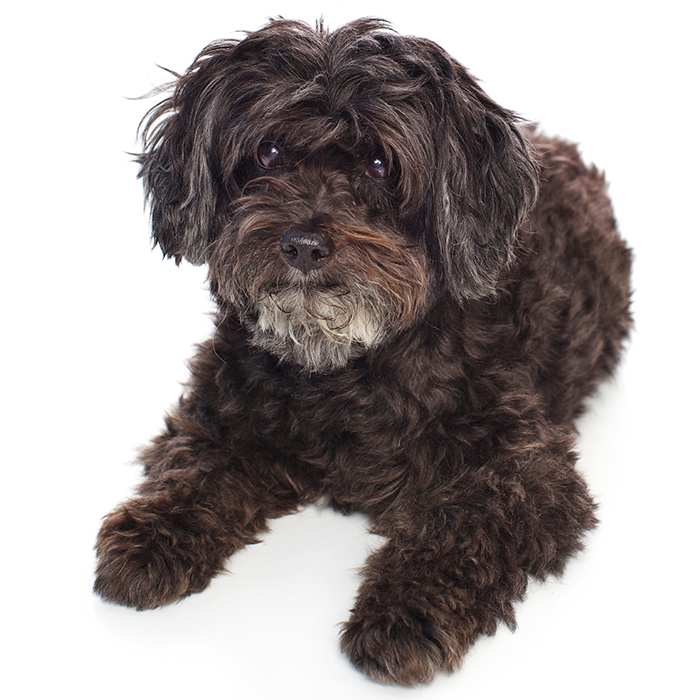Shiba Inu
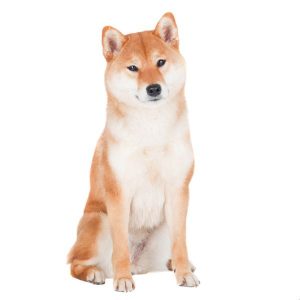

| Recommended for | Experienced owners |
| Breed Classification | Non-sporting |
| Other names | The Shiba |
| Lifespan | 12 to 15 years |
| Size | Small to medium |
| Temperament | Spirited, good-natured, alert, affectionate |
| Intelligence | Above average |
| Tendency to bark | Low to medium |
| Maintenance Level | Medium |
| Health Risk | This breed has an around average probability of having health issues in its lifetime, hence it is one of the more affordable breeds to insure. |
Insuring a Shiba Inu?
Get award-winning cover with more benefits and up to 80% of eligible vet bills reimbursed. Find out about your cover options.
Get a quick quote
Is this breed right for you?
Try our breed selector quiz to find out your best matching breed!
Insuring a Shiba Inu?
Get award-winning cover with more benefits and up to 80% of eligible vet bills reimbursed. Find out about your cover options.
Get a quick quote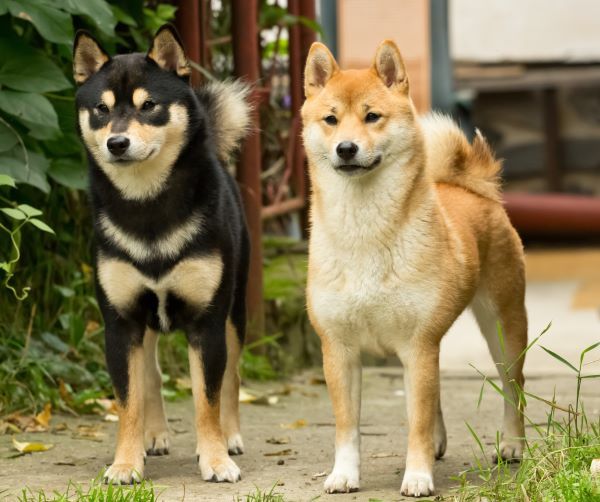
Breed history of Shiba Inus
An ancient Japanese breed that has been around since at least 300 B.C., the Shiba Inu was originally developed for hunting by sight and scent in the dense undergrowth of Japan’s rugged mountains. ‘Shiba’ means ‘brushwood’ in Japanese, referring either to the brush in the mountains or to the dog’s reddish colour, while ‘Inu’ means ‘dog’. A superb hunter, the hardy Shiba was used to flush birds and small game out of the bushes and to hunt wild boar in packs.
Possibly having its origins in the extinct Japanese wolf, the Shiba and other early Japanese breeds remained almost unaltered for thousands of years because of the country’s geography and isolation. During the 1900’s, Japanese officials embarked on an effort to classify and preserve these breeds, and researchers scoured the countryside for them, ultimately identifying six distinctive breeds. They were declared “Nihon Ken”, national treasures of the country. Importantly, this means that the government is involved in their preservation.
At the end of World War II the breed almost became extinct because of a nationwide food shortage and a canine distemper epidemic. Fortunately, breeding programs that began after the war helped the breed bounce back. Today the Shiba is the most popular companion dog in Japan and comprise around 80% of the dogs bred currently in Japan. Imported from Japan to the USA as recently as 60 years ago, Shibas are steadily growing in popularity in the West.
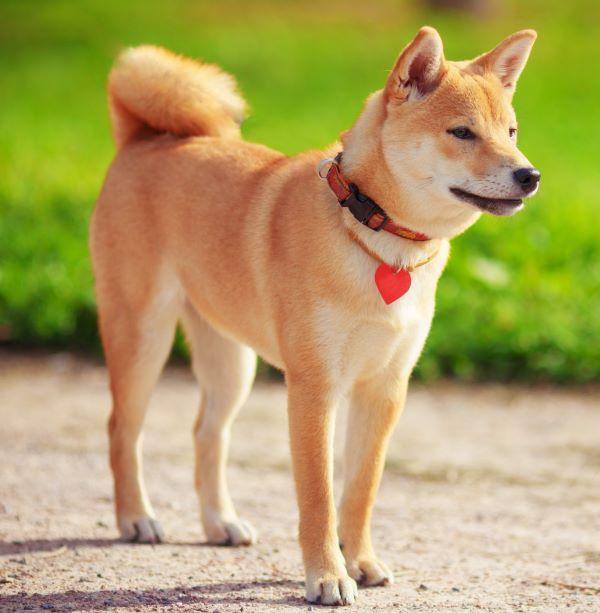
Physical description of Shiba Inus
A small to medium sized dog, the Shiba is the smallest of the Japanese native dog breeds. It has a compact frame with well-developed muscles and a thick, sturdy neck and chest.
The Shiba’s eyes are black rimmed and somewhat triangular in shape, and have an alert expression. With small pointy ears, a wedge-shaped snout and a tail that curls high over its back, the Shiba has a fox-like appearance. They have a short, double coat with a soft, thick undercoat and a stiff and straight outer coat.
As puppies, Shiba Inus are the cutest thing you have ever seen – they look like a cross between a baby fox and a bear cub.
| Weight range | Males 8 to 11 kg; females 6.8 to 9 kg |
| Height range | Males 38 to 41 cm; females 35 to 38 cm |
| Colours | Black & tan, cream, red and sesame, with white markings |
| Coat length | Short |
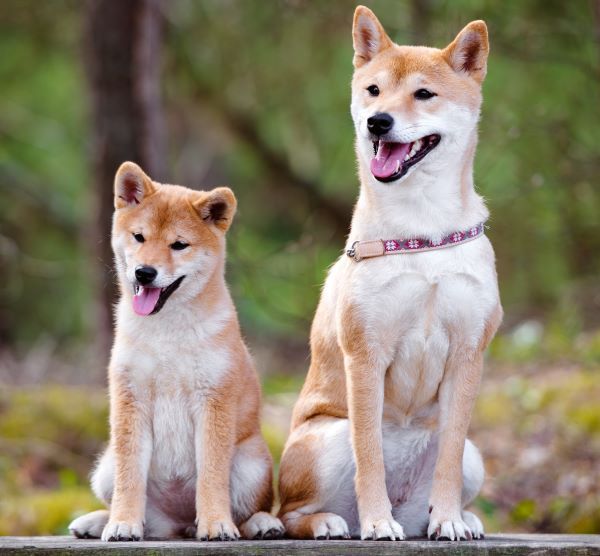
Shiba Inu personality and temperament
Shiba Inus are brave, confident, spirited, good-natured dogs with a mind of their own. They are loyal and affectionate with family members and people they’re familiar with, but can be reserved toward strangers.
Described as being cat-like in personality, they have an endearing playfulness and endless inquisitiveness, which they retain mostly until old age. Alert and agile with keen senses, they are also excellent watchdogs.
The breed has a strong prey drive that can be hard to control and off-leash time needs to be well managed. Inside the house they are more relaxed, and you will mostly find them lounging on their bed and hardly hear any barking. They can do well in flats and smaller homes if they have enough opportunities for exercise.
In general, once they reach maturity, Shibas are not hugely destructive when left alone, but some can suffer separation anxiety. A securely fenced yard is a must – some Shibas have been known to climb six-foot fences.
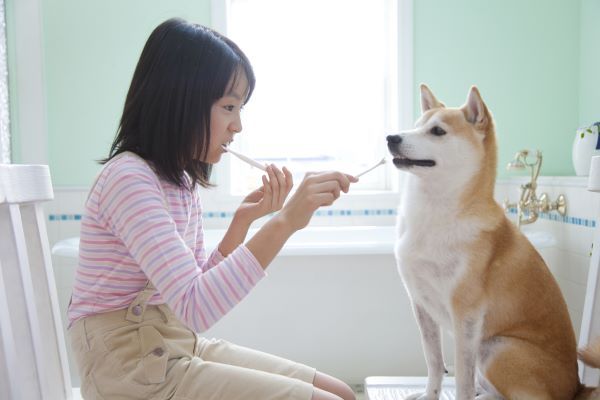
Shiba Inus with kids and other pets
Shiba Inus make great family companions. As with all dogs, young children and pets should always be supervised when together.
Shibas are best suited for households with no other animals as they will likely see them as rivals or prey and can sometimes act aggressively towards them. They can remain quite reserved towards other dogs even when well socialised as a puppy, and don’t need other dogs in their lives to be happy.
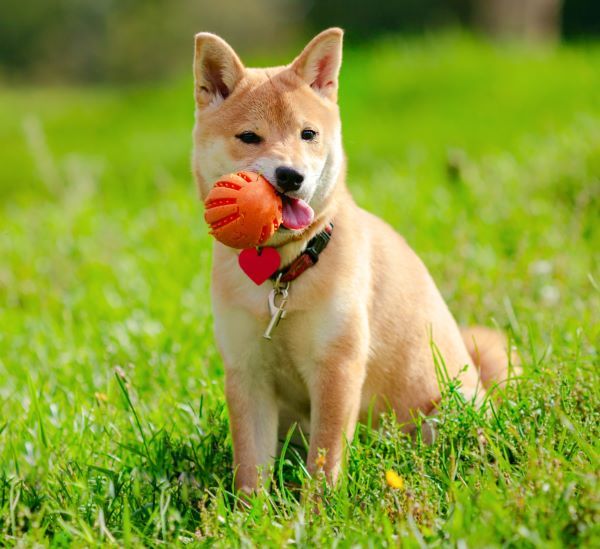
Shiba Inu training and exercise
Most Shibas are fairly energetic and love to go for daily walks. They need plenty of outdoor adventures and opportunities to run off some steam. A versatile breed, they are suited to a range of activities from hunting to dog sports. They also have a passion for fetch that can prove to be a very effective exercise option.
Shibas must be kept in a fully enclosed yard and should always be walked on lead. Their natural hunting instinct is always present and given the opportunity, they will be off and may not heed your efforts to call them back. An open door, an unlocked gate, a moment of inattentiveness, and the Shiba may be gone forever.
Training and socialisation with both people and other dogs and animals from a young age is recommended. Because of their willpower and stubbornness, they need to be managed with strong leadership skills. They like to push boundaries, and even when trained, they will always keep this bit of independence.
On the positive side, a Shiba is practically born housebroken. By 4 weeks of age the puppy is trying to get as far away from his sleeping area as possible to eliminate. By 5 weeks the puppy will hold it all night and wait until taken outside to go. Controlling the bladder takes a little longer and depends a lot on immediate access to outdoors and diligence of the owner.
| Energy level | Medium to high |
| Exercise requirements | Medium to high |
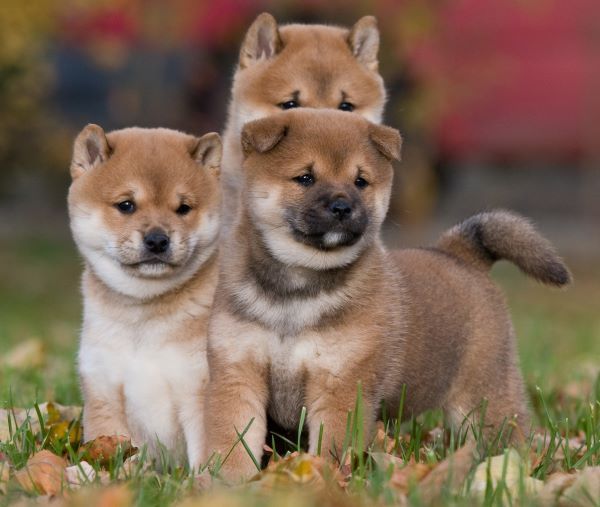
Shiba Inu feeding and nutrition
The Shiba Inu should be fed a premium, high-quality dog food appropriate to the dog’s age (puppy, adult, or senior) and activity level.
Some Shibas are picky, and others will eat anything in sight. The latter group and those that aren’t sufficiently exercised may become overweight, so watch your dog’s calorie consumption and weight level and don’t overindulge in the treats department.
The breed can develop food allergies, so a healthy, consistent diet is a must. Check with your vet if you have any concerns about your Shiba’s weight or diet.
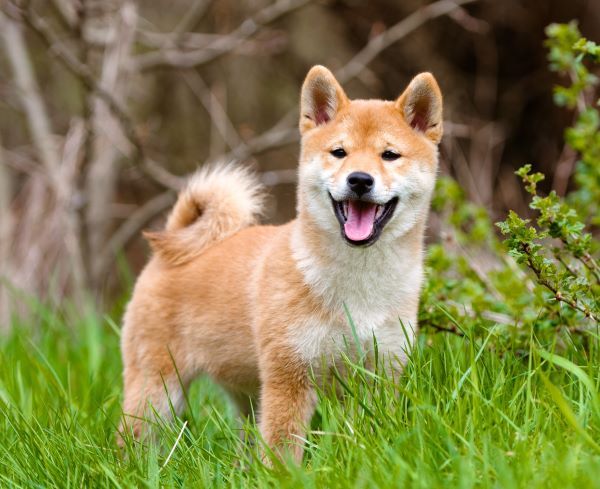
Shiba Inu care and grooming
Said to be cat-like in many ways, the Shiba does not have a doggy odour and keeps itself fastidiously clean.
Generally, the Shiba Inu is easily maintained. The coat requires extra attention during shedding seasons, but outside of this, a regular weekly brush and occasional bath will keep it under control. The breed does not require any clipping.
Fairly heavy shedding usually occurs twice a year and it can take up to a month for the coat to shed. Grooming through this stage is essential, while a bath and blow dry with a strong hairdryer – not too hot – will also help to remove the coat without pulling or scraping the skin.
Health issues for Shiba Inus
- Hip Dysplasia is a hereditary condition that is common in many breeds where the hip doesn’t develop as it should, often resulting in prolonged limping and eventually lameness in later life.
- Patellar luxation is a condition common among small breeds, and occurs when the thigh bone, knee cap and calf are not in correct alignment, leading to lameness or an irregular gait (often a skip or a hop) and development of arthritis later in the dog’s life. The condition is usually fixable with surgery, but dogs with less serious cases often do not require treatment and are able to lead normal lives.
- Eye diseases that can occur in Shiba Inus include Progressive Retinal Atrophy, cataracts and glaucoma. Symptoms include cloudy eyes, red eyes and blindness.
- Skin Allergies are common in Shibas and regular bathing may be required.
Not all conditions are covered by Pet Insurance. For details of Bow Wow Meow Pet Insurance cover, refer to the Product Disclosure Statement.
What do Shiba Inu owners claim for the most?
Thinking about insuring a Shiba Inu
Thinking about insuring a Shiba Inu
Learn moreThinking about insuring a Shiba Inu
Learn moreFree engraved pet ID tag on sign up3
Customer Satisfaction
21 day cooling off
Easy to use Pet Portal

GapOnly® in vet claims
MORE INFORMATION
Shiba Inu Club of Australia and New Zealand: https://www.facebook.com/groups/631295663575024/
Shiba Inu Rescue Australia: https://www.facebook.com/groups/271732576247517/


